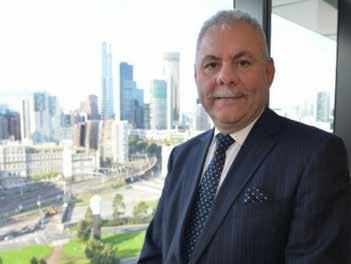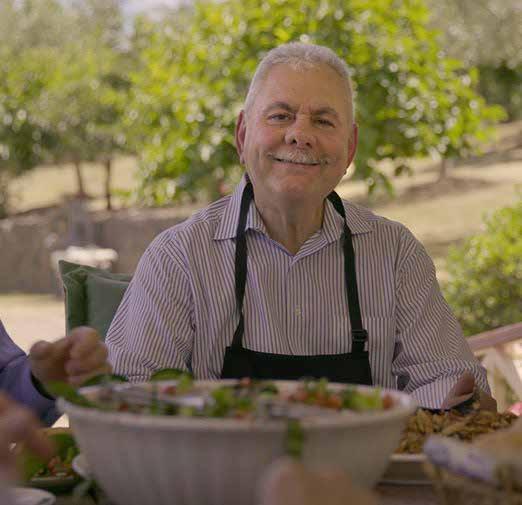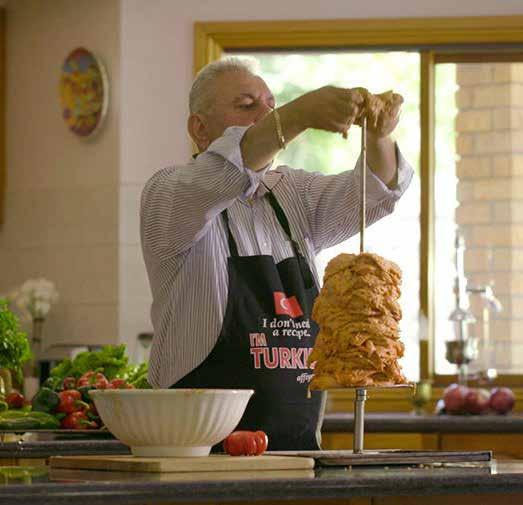
10 minute read
Inclusionary Leadership 12Huseyin (Huss) Mustafa OAM - General Manager, Multicultural Community Banking Australia, Commonwealth Bank of Australia
Inclusionary Leadership
Author Diana Ryall AM’s book, Inclusionary Leadership, published in 2017, profiled A Taste of Harmony hero Ambassador Huss Mustafa OAM among a diverse group of 18 inclusive leaders in Australian business. Read Huss Mustafa’s story in our feature section on pages 10-13. A Taste of Harmony provides the opportunity to celebrate and discuss diversity over a meal. It’s an inclusive opportunity for everyone, regardless of background, to share stories and get to know their co-workers and their culture. In her book, Diana sought to share what qualities made a leader inclusionary, both inclusive and visionary. “This book is a collection of stories. People connect with stories quickly.” Diana said. “We know that inclusion is still a challenge in a number of workplaces, and that’s exactly why we put the book together. If we can tell a story of what inclusion looks and feels like for them – that gives us an opportunity to make a difference.” “If you have a workplace where people walk in the door and they feel a part of the group, they belong, they don’t have to cover a part of themselves and their skill set is valued – that makes a great difference.” “People who have felt exclusion or difference find it easier to accept difference” Diana said. In this book, Huss Mustafa shared that he was bullied by his peers as the only non-Anglo in school. “Huss is fabulous,” she said. “The day we met, he invited me to an Iftar dinner and was so enthusiastic and was willing to share an exchange of cultural background and religion. It was a lovely evening, and of course – was over food!” Is food a tool to provide permission to approach some difficult topics? Can cultural identity sometimes be a taboo in the workplace? For more on Inclusionary Leadership, go to: https://www.tasteofharmony.org.au/what-isinclusionary-leadership/
Advertisement
Huseyin (Huss) Mustafa OAM

General Manager, Multicultural Community Banking Australia, Commonwealth Bank of Australia
Huss Mustafa OAM has a Turkish Cypriot heritage with very humble beginnings who migrated to Australia with his family at the age of 10 and is currently a Senior Executive at the Commonwealth Bank of Australia, with over 43 years of service. Within 6 years of arriving in Australia in 1968, with no knowledge of the English language he passed all his grades, and in 1974 obtained a position at the then State Bank Of Victoria, which merged with The Commonwealth Bank in 1991. He is a founding member of the Australian Turkish Business Council and is currently the President in his tenth term. Huss has also served three terms on the Australian of the Year judging panel. Huss Mustafa has been a proud ambassador of a Taste of Harmony, Australia’s largest celebration of workplace cultural diversity He has been a role model citizen within our Community and continues to mentor a large number of professionals and business owners. In 2014 he
“Often senior leaders can become distant from their broader team. Huss’s passion to remain present in the everyday lives of his team, engage with people from diverse backgrounds, and to connect his team with our multicultural communities is a distinct leadership capability.”
- Claire Roberts, Executive General Manager, Business Banking SME, CBA
was included on the Queen’s Birthday Honors list and received the Order of Australia Medal for his contribution to Multiculturalism and Business. CEO and Head of College, Dr Kerry Bennett met with Huss recently and he has very kindly consented to have his interview republished here.
What does inclusive leadership mean to you?
For me, an inclusive leader provides opportunities to all their team members to play an active role in adding value to the business and the team irrespective of each individual’s background. Its about tapping into unique talents and experiences that each team member can contribute, by reference to their individual background. The more diverse the talent pool, the more innovative the outcome, and the more that outcome is reflective of the broader community at large. Inclusive leadership creates an environment that enables individuals to participate freely and bring all of themselves to work, without fear of criticism or judgement. It encourages individuals to identify their value proposition and unique qualities within themselves that they can volunteer to enrich the business.
As you took on more responsibility as a leader, when did diversity and inclusion become important to you?
I became cognisant of the importance and power of diversity and inclusion in 1992 when I became the first Turkish bank manager in Australia. I soon learned that this is a strong value proposition for my business. Before long, I had Turkish clients travelling from regional Victoria to Melbourne to meet with me and transfer their banking to my branch. This became a competitive advantage for me, and while the bank’s business was growing at 3% per year, my branch was growing at 12% per year. I found myself at cultural festivals connecting with my community and creating a sense of affinity while building the brand and selling business. I developed a sense of trust in the community that lead to ongoing referrals and continual growth of my business. The next step was to identify people in my team from diverse cultural backgrounds who could also connect with their own communities. I was appointed to a regional manager role and I identified the need for staff in branches with bilingual skills to ensure that members of the migrant community felt comfortable and confident in their dealings with the bank, in their own native language. I was soon mentoring members in my team who became ambassadors of their own communities.
Have you ever worked in an organisation where you felt excluded? If so, what caused this and how do you feel?
I am proud to say that the only organisation I have ever worked for since the age of 15 is the Commonwealth Bank (CBA). I commenced work as a bank clerk at a time when multiculturalism was not celebrated and when assimilation was the key to surviving, compelling me to change my name to ‘Chris’. I didn’t possess the common traits of an Australian and the made it difficult for me to fit in and connect socially with my colleagues. I looked, spoke and thought differently to my peers and instead of this being regarded as an asset to the organisation as it is today, at that time, it made me feel like my co-workers didn’t relate to me. In the early days, when transparency and fairness was not a priority like it is today, I felt it was difficult for me to secure the same opportunities as my peers. I recall that I was delegated less complex duties than my colleagues. This made me feel less valued and I remember wanting to be more like my peers.
“Huss is a highly inclusive and value-driven leader who embraces all aspects of diversity within his team. He is a passionate advocate for multiculturalism and creates an environment where people can bring their whole self to a workplace.”
- Adam Bennett, Group Executive Business and Private Banking, CBA
It troubles me to admit that I wanted to assimilate rather than be seen as different including consciously speaking in the most ‘Australian’, accent-free way that I could. Fortunately, I was able to overcome these obstacles and despite my earlier experiences, I was promoted to assistant manager within 10 years in the organisation. This was an above-average achievement at the time.
What link do you see between employee engagement and inclusion?
I see the link between the two as paramount. Employee engagement goes to the heart of feeling included in the workplace. I want my team to feel supported and to have a sense of belonging in the business. I strive to encourage and inspire my people to be the best that they can be so that they can reap[ the rewards of their efforts. Work should be enjoyable and a place where people can grow and achieve their career aspirations.
What actions have you taken to include diversity in your teams and groups?
I have taken steps to ensure my team is reflective of the diverse community that we live in. My team is made up of people from 36 different cultural backgrounds, and I actively seek opportunities to enhance the diversity of the team as I value the benefit it produces. I am conscious of avoiding any unconscious biases that may exist, be it in relation to gender, cultural background, sexual orientation, disability or age. It is imperative to embrace people the way they are. As a testament to my passion for diversity, I am a founding member of the bank’s internal cultural diversity steering group called ‘Mosaic’, in which I lead the community stream that focuses on engagement with the local community. I am proud of the achievements of Mosaic, particularly recently with the hijab being officially incorporated into the CBA corporate wardrobe. As a founding member and current President of the Australian Turkish Business Council (ATBC), I have played an integral role in improving trade between Australia and Turkey and hosting mutually beneficial events that promote business between the two countries. In my role, I have hosted 14 Iftar dinners during the holy month of Ramadan. The next natural step was to continue this actively as part of the CBA and, in 2009, I hosted the first CBA Iftar dinner which has continued to be a successful event held annually. The event welcomes people from all faiths and cultural backgrounds, with the focus on promotion of social harmony and cohesion.
How would you describe your leadership style?
I am a highly motivated, energetic and passionate leader with a firm focus on people. I live and breathe the vision and values of the business, and I strive to be a role model for my people. For me, integrity is key. I want to be that person who helps people get to where they want to be. I pride myself in being an approachable leader. I prioritise taking the time to motivate my team and instill confidence in them. I get great satisfaction from developing and producing great leaders.
How do you define merits?
In business, I think that ‘merit’ cannot be defined by an exhaustive list of attributes. Rather, it can be defined by those qualities and skills that best fit the requisites of the given role. Merit should be free from conscious and unconscious biases.
Do you have examples of women who have thrived under your leadership? Did this require you to do things differently?
Under my leadership, I have mentored and supported numerous female members of my team. I have
recruited junior staff, identified talent and sponsored women in the organisation to grow and develop within and outside my team. In particular, I first employed a young, ambitious female relationship manager and over the years I invested in her development and promoted her to an executive manager role. I recognised that to propel her further she will benefit from further tertiary education so I sponsored her to complete her MBA. I wanted her to have exposure to new opportunities and supported her transition to another business unit that will enhance her leadership capability. This resulted in her promotion to general manager.
How did you hone your skills to support diverse employees to strive in your organisation?
I used my experience and story as a platform to celebrate the benefits of diversity and encourage others to do the same. I was 10 years old when I migrated to Australia and did not know a word of English. In school, my teacher told my parents that my potential was limited to unskilled work. This was my driving motivation to
FEATURE
prove to myself that I could be more, and to prove my teacher wrong. This is something I have carried with me all my life. Notwithstanding the fact I left school in year 10, I went on to undertake undergraduate and postgraduate studies later in life, as well as a master’s degree in management. I learned that when I shared my story, it inspired others to have confidence in their own ability to achieve similar career outcomes, despite how unique their journey in life may be.
What advice would you give other leaders who wish to develop greater inclusivity in their workplace?
Get to know your team. Understand what motivates each individual and show interest in their ambitions. Ask yourself, ‘Is my team reflective of the community we live in?’ ‘If not, why not?’ and ‘What can be done to ride the coat-tails of diversity in the workforce and all the benefits it can provide?’ People should feel proud to be their true selves at work and you will see it leads to greater, more positive outcomes.












